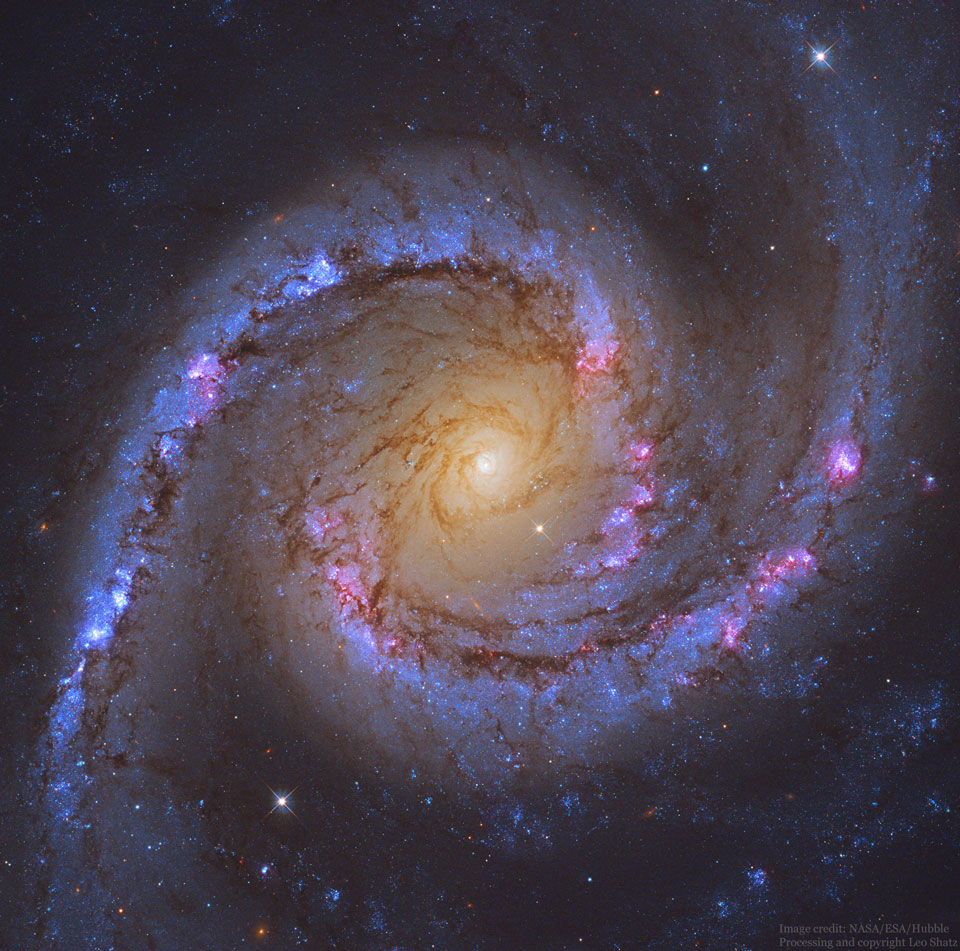Page 1 of 1
APOD: NGC 1566: The Spanish Dancer Spiral... (2019 Jul 02)
Posted: Tue Jul 02, 2019 4:07 am
by APOD Robot
 NGC 1566: The Spanish Dancer Spiral Galaxy
Explanation:
NGC 1566: The Spanish Dancer Spiral Galaxy
Explanation: If not perfect, then this
spiral galaxy is at least one of the most photogenic. An
island universe containing billions of stars and situated about 40 million light-years away toward the constellation of the Dolphinfish (
Dorado),
NGC 1566 presents a gorgeous
face-on view. Classified as a
grand design spiral, NGC 1566's shows two prominent and graceful spiral arms that are traced by bright
blue star clusters and dark
cosmic dust lanes. Numerous
Hubble Space Telescope images of
NGC 1566 have been taken to study
star formation,
supernovas, and the spiral's unusually active center. Some of these images, stored online in the
Hubble Legacy Archive, were freely downloaded, combined, and digitally processed by an industrious amateur to create the featured image.
NGC 1566's flaring center makes the spiral one of the closest and brightest
Seyfert galaxies, likely housing a central
supermassive black hole wreaking havoc on
surrounding stars and gas.
Re: APOD: NGC 1566: The Spanish Dancer Spiral... (2019 Jul 02)
Posted: Tue Jul 02, 2019 4:23 am
by Boomer12k
Should have a great view of BIG nebula there....
:---[===] *
Re: APOD: NGC 1566: The Spanish Dancer Spiral... (2019 Jul 02)
Posted: Tue Jul 02, 2019 5:33 am
by Ann
Wow, what a stunning image!

Thank you, NASA, ESA, Hubble and Leo Shatz!
And what a beauty this galaxy is, not least in the wonderful image that is today's APOD!
Catriona Gray of the Philippines is Miss Universe for 2019, but I think that NGC 1566 is a strong contender for Miss Galaxy of the Nearby Universe!
Spacetelescope wrote:
NGC 1566 is an intermediate spiral galaxy, meaning that while it does not have a well defined bar-shaped region of stars at its centre — like barred spirals — it is not quite an unbarred spiral either (heic9902o).
NASA, ESA, Hubble and Leo Shatz
Yes, NGC 1566 is certainly "a lot less barred" than NGC 1300!
Flocculent galaxy NGC 2841. Hubble/Wikisky.
But there are some similarities between NGC 1566 and NGC 1300. They are both "grand design galaxies", which means that they have two long spiral arms. The opposite of grand design spirals (disregarding ellipticals and irregular galaxies) are flocculent spirals, such as NGC 2841 at left.
To return to NGC 1566 and NGC 1300, they both have small spirals in their cores, and presumably huge supermassive black holes in there. The black hole of NGC 1300 may have a mass of ~70 million solar masses, but I have found no info on the mass of the black hole of NGC 1566. (But according to
this not so helpful list, NGC 1566 is listed among galaxies that have the most massive black holes. Please note that the galaxies are listed according to their catalogues, and then for each catalogue, the list starts with the galaxy with the lowest catalogue number. You have to scroll down to the NGC entries to find NGC 1566.)
Anyway,
three quarks for Muster Mark, and hooray for the galactic beauty queen, NGC 1566!

Ann
Re: APOD: NGC 1566: The Spanish Dancer Spiral... (2019 Jul 02)
Posted: Tue Jul 02, 2019 6:09 am
by DL MARTIN
Until we can collapse the 40 million year time disparity between what we perceive and the state of NGC 1566, similar to Shrodinger's Cat, how do we know this galaxy exists?
Re: APOD: NGC 1566: The Spanish Dancer Spiral... (2019 Jul 02)
Posted: Tue Jul 02, 2019 7:08 am
by Ann
DL MARTIN wrote: ↑Tue Jul 02, 2019 6:09 am
Until we can collapse the 40 million year time disparity between what we perceive and the state of NGC 1566, similar to Shrodinger's Cat, how do we know this galaxy exists?
Well, you have probably never met a lot of the people who are members of Starship Asterisk*. How do you know that we exist?
Come to think of it, are you absolutely sure that the world that you can see around you exists at all? Maybe it's all a dream?
I'm joking. But a lot of people have observed NGC 1566 with their own eyes, and many people have photographed it. That's enough for me to accept that NGC 1566 does exist.
Perhaps you mean that NGC 1566 may have been destroyed in the 40 million years it took for its light to reach us? The way I understand it - and my own understanding is all I can refer to, sorry - galaxies aren't destroyed unless they undergo a violent merger. There is apparently a pair of interacting galaxies, NGC 1553 and NGC 1549, which are located moderately close to NGC 1566, but not close enough to affect NGC 1566 much at all in 40 million years.
Ann
Re: APOD: NGC 1566: The Spanish Dancer Spiral... (2019 Jul 02)
Posted: Tue Jul 02, 2019 12:49 pm
by orin stepanek
Pretty Spiral; Shame I would have to stretch it to use as a wallpaper!

Re: APOD: NGC 1566: The Spanish Dancer Spiral... (2019 Jul 02)
Posted: Tue Jul 02, 2019 3:42 pm
by sillyworm 2
Gorgeous Galaxy.Fireworks galore! Just look at that star forming activity.I am also curious as to what the Universe and all the wondrous objects out there look like now after millions and millions of years.I so wish we could just get a glimpse of our own home galaxy.Looking forward to all the knowledge yet to acquire.
Re: APOD: NGC 1566: The Spanish Dancer Spiral... (2019 Jul 02)
Posted: Tue Jul 02, 2019 5:35 pm
by spinlock
Actually, all colors are boosted by long exposure and digital processing. It's amazing to realize that even our own Milky Way galaxy is seen as colorless with our own eyes, except few nearby bright stars. It's very likely that if we could look at galaxy like NGC 1566 from within, it would look colorless exactly like our Milky Way.
Re: APOD: NGC 1566: The Spanish Dancer Spiral... (2019 Jul 02)
Posted: Tue Jul 02, 2019 7:56 pm
by BDanielMayfield
DL MARTIN wrote: ↑Tue Jul 02, 2019 6:09 am
Until we can collapse the 40 million year time disparity between what we perceive and the state of NGC 1566, similar to Shrodinger's Cat, how do we know this galaxy exists?
On astronomical time scales 40 million years is fairly brief. For instance it is only about 1/6th of 1 solar orbit around the core of our galaxy. Sol is now on about its 20th orbit.
We can be confident that NGC 1566 will still exist in 40 million years because the laws of physics are universal and we know of nothing that could reasonably cause such a colossal structure to disappear in such a short time span. It might look a little different in 40 million years, but probably not by much.
Bruce
Re: APOD: NGC 1566: The Spanish Dancer Spiral... (2019 Jul 02)
Posted: Tue Jul 02, 2019 8:03 pm
by MoreInput
Wonderful galaxy! One of my new favorites.
Mass of the central black hole according to this paper (2015,
https://arxiv.org/pdf/1508.02664.pdf, page 13): "The mean BH mass is (5.3 ± 2.9) × 10^6" sun masses. So it is a lighter than NGC 1300's BH. Milky way has 4,1 x 10^6 sun masses.
(Edit: Wrong comparison)
 NGC 1566: The Spanish Dancer Spiral Galaxy
NGC 1566: The Spanish Dancer Spiral Galaxy



